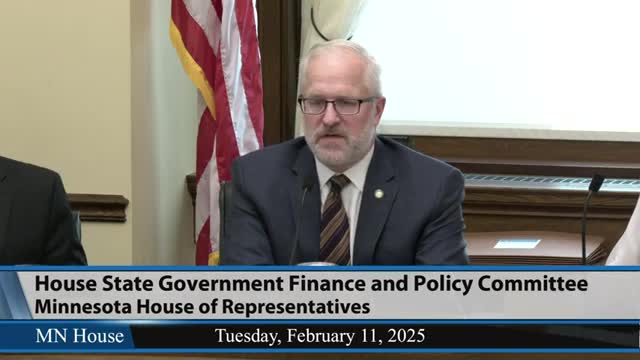Representative Davis lays out broad anti-fraud package; committee lays bill over for further work
Get AI-powered insights, summaries, and transcripts
Subscribe
Summary
Representative Pat Davis presented House File 2, a broad anti-fraud package that would require agency reporting, organizational charts online, unannounced site visits and grant verification. The committee received testimony and laid the bill over for further drafting and amendment work.
Representative Pat Davis presented House File 2 on Feb. 11 as a package of measures intended to prevent waste, fraud and abuse in state grantmaking and agency operations. Committee members heard agency and public testimony and agreed to lay the bill over for further work rather than advance it at the hearing.
What the bill proposes: Davis described HF2 as a sweeping measure that would require state agencies to report suspected fraud, post organizational charts online, perform unannounced in-person site visits to verify grantees’ work, require financial reconciliation of grant expenditures, and pause or terminate grants when criminal charges or convictions occur. Davis framed the bill as a response to recent high-profile fraud cases and said constituents want urgent action.
Testimony and concerns: Stacy Christiansen, deputy commissioner at the Minnesota Department of Administration and representative of the Office of Grants Management, said that many HF2 provisions align with current Office of Grants Management policy—such as requiring policy frameworks and withholding funds when progress reports are missing—but warned that some changes would be difficult for small entities and that mandating unannounced visits and immediate criminal‑related suspensions could create operational and legal hurdles. Christiansen recommended working with agencies to refine language and implementation timelines.
Public testimony: Two public testifiers spoke in support of stronger anti-fraud measures. Dale Witherington of Restore Minnesota urged the committee to “please support HF2 as a beginning to cleaning up the financial mess Minnesota is in.” Kendall Qualls, a Medina resident, called for bipartisan urgency to address fraud and said constituents expect action.
Committee action: The committee adopted an author’s amendment (A4) to put the bill into the author’s preferred form and then laid HF2 over for further drafting and amendment rather than voting to send it to another committee. Members said they would return to HF2 with technical edits and to resolve concerns about scope, data classification, and the operational impact on small grantees.
Ending: Chair Nash said the panel would reconvene on the bill at a later date; members and agency staff asked for more time to craft precise language that balances stronger oversight with operational practicality.
